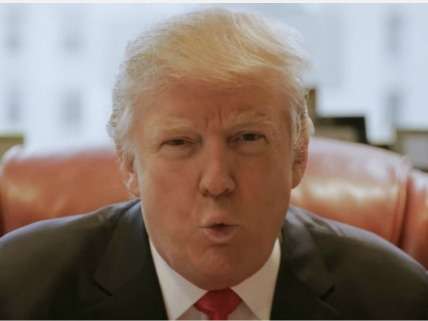Republican National Security Experts Say Trump 'Would Be the Most Reckless President in American History'
Given Clinton's warmongering, he may not even be the most reckless candidate this year.

Last March, when it still looked like someone other than Donald Trump might win the Republican presidential nomination, 122 "GOP national security leaders" declared him unfit for office. A similar letter published yesterday has just 50 signatures. Does that mean Trump has become more popular with Republican national security experts, or that some of them have accepted him as at least preferable to Hillary Clinton? Not necessarily.
Twenty-one of the people who signed the earlier letter also signed the new one, including former State Department counselor Eliot Cohen (who organized the March letter), former Secretary of Homeland Security Michael Chertoff, former Undersecretary of Defense Dov Zakheim, and former U.S. Trade Representative Robert Zoellick (who also has served as president of the World Bank). Of the remaining 101, many are on record as continuing to oppose Trump, and some of them have joined Cohen in supporting Clinton instead. Among the rest, the only anti-Trump waverer I have noticed is former Attorney General Michael Mukasey, who signed the first letter and subsequently warned that "a Donald Trump presidency would imperil our national security" but nevertheless spoke at the convention where Trump was nominated, although his remarks were limited to Clinton's awfulness. I don't know how many of the March letter's signers, if any, have followed Mukasey's example.
The new signatories include former Secretary of Homeland Security Tom Ridge, former CIA and NSA director Michael Hayden, former Director of National Intelligence John Negroponte, and former Deputy Attorney General Larry Thompson. Most of the statement to which they have affixed their names is hard to quarrel with, including these parts:
Mr. Trump lacks the character, values, and experience to be President. He weakens U.S. moral authority as the leader of the free world. He appears to lack basic knowledge about and belief in the U.S. Constitution, U.S. laws, and U.S. institutions, including religious tolerance, freedom of the press, and an independent judiciary….
Unlike previous Presidents who had limited experience in foreign affairs, Mr. Trump has shown no interest in educating himself. He continues to display an alarming ignorance of basic facts of contemporary international politics….
Mr. Trump lacks the temperament to be President. In our experience, a President must be willing to listen to his advisers and department heads; must encourage consideration of conflicting views; and must acknowledge errors and learn from them. A President must be disciplined, control emotions, and act only after reflection and careful deliberation. A President must maintain cordial relationships with leaders of countries of different backgrounds and must have their respect and trust.
In our judgment, Mr. Trump has none of these critical qualities. He is unable or unwilling to separate truth from falsehood. He does not encourage conflicting views. He lacks self-control and acts impetuously. He cannot tolerate personal criticism. He has alarmed our closest allies with his erratic behavior.
The letter does not quite endorse Clinton, saying "many of us…have doubts" about her. But it is clear that Cohen and many of the other signatories prefer Clinton because she is a more consistent hawk. The letter contains hints of the hackles raised by Trump's intermittent skepticism of foreign intervention and foreign entanglements:
Mr. Trump has demonstrated repeatedly that he has little understanding of America's vital national interests, its complex diplomatic challenges, its indispensable alliances, and the democratic values on which U.S. foreign policy must be based….
We are convinced that in the Oval Office, he would be the most reckless President in American history.
While Trump has the potential to claim that title, I am not at all convinced that Clinton's reckless warmongering is the safer choice. Trump's response to the letter says the signatories deserve "blame for making the world such a dangerous place," criticizes Clinton for fostering "the rise of ISIS" by supporting the wars in Iraq and Libya, and promises "an America First vision" that "seeks peace over war" (except when it comes to trade?) and "makes other countries pay their fair share for their protection." But he also promises to "rebuild[] our military" and "stand[] up to foreign dictators." Trump's approach to foreign policy, like the rest of his platform, remains a muddle. It may nevertheless be better than Clinton's clarity.


Show Comments (84)